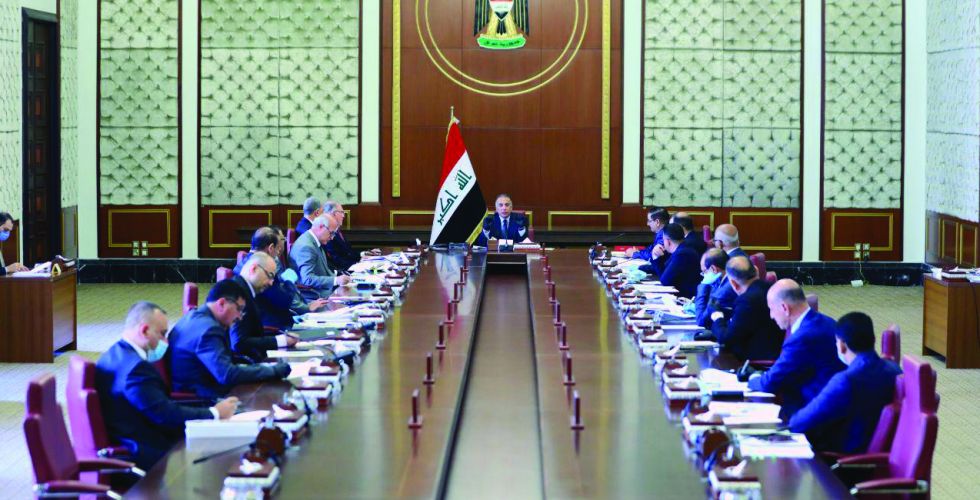The Cabinet decides to reduce and rationalize the administrative structures of the country
 Baghdad / Al-Sabah – During its second regular session headed by Prime Minister Mustafa Al-Kazemi yesterday, the Council of Ministers decided to reduce and rationalize the administrative structures of the state, and while it formed the Emergency Cell for Financial Reform and Managing the Financial Situation in the Light of the Current Crisis, directed the Ministry of Labor and Social Affairs in coordination with the Ministry of Planning and Finance to study the expansion of the base covered by law Social protection.
Baghdad / Al-Sabah – During its second regular session headed by Prime Minister Mustafa Al-Kazemi yesterday, the Council of Ministers decided to reduce and rationalize the administrative structures of the state, and while it formed the Emergency Cell for Financial Reform and Managing the Financial Situation in the Light of the Current Crisis, directed the Ministry of Labor and Social Affairs in coordination with the Ministry of Planning and Finance to study the expansion of the base covered by law Social protection.
A statement of the Prime Minister’s Office received by Al-Sabah stated that “Al-Kazemi opened the session with a speech in which he emphasized that this government is the government of difficult challenges, the most important of which is the economic challenge, the fight against poverty and unemployment among young people, and the fair distribution of wealth.” And work to develop state institutions, not political action. ”
The Prime Minister reiterated his “protection of the right to demonstrate and intolerance of any aggression against the demonstrators, and that the government aims to achieve their legitimate aspirations,” noting by saying: “We will not be courted at the expense of the dignity of the citizen and the interests of the nation, and we will work to save what can be saved, confront crises and diversify state resources.”
On the work of the armed forces, Al-Kazemi stressed, according to the statement, that “the heroic army and security forces have endured a lot, and the prestige of the military and security institutions must be restored.”
The Cabinet issued a number of decisions, including:
1. Reducing and rationalizing the administrative structures of the state by providing each government agency with its vision in this area.
2. Take appropriate measures to legislate the laws required for the success of the e-government, and for ministries and government agencies to expedite their procedures to automate their work, especially in the area of customs and tax, and to provide monthly reports on rates submitted to the General Secretariat of the Council of Ministers.
3.Re-examine the draft laws related to fighting corruption, and to activate the measures to combat it and strengthen their efficacy, and to emphasize strengthening the role of the institutions concerned with that from the Integrity Commission and the Federal Financial Supervision Bureau in coordination with the General Secretariat of the Council of Ministers.
4. Emphasizing the freedom to exchange information and the right to obtain it by expediting the legislation on the right to obtain information.
5. Assigning the Ministry of Planning in coordination with the concerned authorities to review instructions for implementing government contracts to ensure updating of the approved standards in the awarding of tenders, and also to update the approved standards in selecting investment projects.
6. Providing the Federal Service Council with the appropriate staffing for taking its role and exercising its duties.
7. Agreeing that the Reconstruction Fund for areas affected by terrorist operations implement mobile hospitals to quarantine and treat patients with HIV in the regions that are agreed with the Ministry of Health and the provinces through the grant provided by the Federal Ministry for Economic Cooperation and Development through the German Development Bank of (15,000,000) Fifteen million euros.
8. Accelerate the legislation of the general budget law in line with the requirements of the financial situation, the low level of the oil price, and diversify the budget sources.
9. Urging the Ministry of Oil to expedite the completion of the draft oil and gas law.
10. The Ministry of Labor and Social Affairs, in coordination with the Ministry of Planning and the Ministry of Finance, study to broaden the base of those covered by the Social Protection Law by improving the inclusion mechanism through demographic targeting by adopting poverty and social research data, and the study is presented within a period of one month.
11. Forming an emergency cell for financial reform, forming a cell to manage the financial situation in light of the current financial crisis and putting the necessary solutions to achieve financial reform and improving the performance of financial institutions. The cell will be headed by the Prime Minister and he may authorize the Minister of Finance to manage the sessions in his absence and the membership of each of the Minister of Finance The Minister of Foreign Affairs, the Minister of Planning, the Governor of the Central Bank, the Prime Minister’s advisers whom His Excellency calls the Secretary General of the Council of Ministers, and a representative of the General Secretariat of the Council of Ministers. The cell carries out the following tasks:
1 – Ensure the provision of financial liquidity.
2- Take decisions regarding financial reform by rationalizing expenditures, maximizing resources, and reforming financial institutions, including restructuring them.
3- Establishing financing plans for the reconstruction, development and investment projects, including financing resources and mechanisms outside of government spending.
4- Improving procedures and automating systems in financial institutions.
